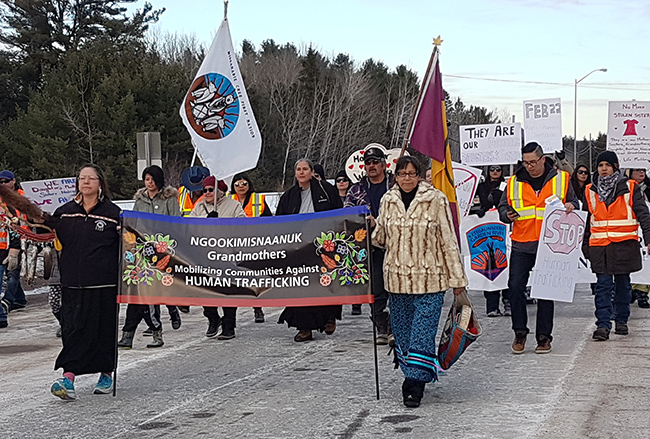In the crime of human trafficking, highways are corridors

By Lynne Brown
SAULT STE. MARIE – On Feb. 22, communities across the province of Ontario took time to mark the first ever provincial anti-human trafficking day.
Locally, members of several First Nation communities along the north shore of L. Huron and L. Superior came together in a peaceful demonstration at the juncture of Highway 11/17 and Hwy. 17B.
With the help of the Sault Ste. Marie Police Service, The OPP and The Anishinabek Police Service, traffic was slowed down in a minor disruption between 5 and 6 pm while demonstrators passed information pamphlets to vehicles traveling through the intersection.
According to the OPP, across Ontario, more and more victims are being recruited from small towns and lured with promises of love and a ‘better life’. Human trafficking involves the recruitment, transportation or harbouring of persons for the purposes of exploitation, typically in the sex industry or for forced labour.
Patricia Lesage, Missanabie Cree First Nation, and project lead in the anti-human trafficking initiative said, “Through recent funding, the Missanabie Cree have been able to hire another individual to support the work of anti-human trafficking.” Eva Dabutch can be contacted at the Missanabie Cree’s downtown office for information and presentations at 705-254-2702.
The initiative represents a collaboration between Missanabie Cree First Nation, Garden River First Nation, Batchewana First Nation and Nimkii Naabkawagan Family Crisis Shelter. Lesage said that the Sault Tribe of Chippewa Indians is also involved in the work to disrupt and end human trafficking.
Ngookimisnaanuk Grandmothers Council again Human Trafficking members Marly Day-Bateman and Alison Recollet led the Feb. 22nd demonstration. Day-Bateman stated that grandmothers from along the north shore of L. Huron came together in 2015 to begin learning and undertaking the work to support women and girls who have been trafficked. “Through ceremony and traditional healing we can help to lift up these women whose spirits have been broken.” She said. “They need us, and we are here for them.”
The Grandmothers Council began through an initiative by P.A.C.T. (Persons against the crime of trafficking in humans) Ottawa. Funding was offered for ‘Project Northern Outreach’, which brought together 12 Anishinaabe grandmothers. In October, 2017, the Grandmothers Council held its first ever Grandmothers Gathering in Sault Ste. Marie. The Gathering was supported by Nimkii Naabkawagan Family Crisis Shelter, The Indian Friendship Centre, The Metis Nation of Ontario, PACT Ottawa and ONWA (Ontario Native Women’s Association).
Marly Day-Bateman said, “The highways between Thunder Bay to the Sault and further east to Sudbury is a known corridor for smuggling humans. Indigenous women and girls are among the most vulnerable for human trafficking. When they come down from remote northern first nation communities to Thunder Bay or The Sault, they are often alone and don’t have money. They are lured into a relationship that takes them into a life of darkness. We need to stop this crime.”
https://www.youtube.com/watch?v=qwE_h3vuGKo&t=1s
Deputy Commissioner Rick Barnum, OPP Investigations and Organized Crime stated, “Human trafficking is a deplorable crime that threatens the safety, livelihood and dignity of those who are being exploited and abused. This is a complex issue that affects some of the most vulnerable people in our society and does not recognize jurisdictional boundaries. It is our duty to act decisively and effectively to recognize and protect these people from exploitation and it is imperative that we have a concentrated effort amongst all our partners to be effective.”
The indicators of human trafficking are not always obvious. Although the presence of one indicator does not necessarily identify human trafficking, a variety of indicators may point to the fact that an individual is being trafficked and needs help. These indicators may include:
- The individual seems afraid, anxious or depressed.
- Another person controls the individual’s conversation.
- Another person speaks on behalf of the individual.
- Another person holds or controls the individual’s identification, which may be real or fake.
- There are signs of poor health, hygiene and/or nutrition.
- The individual is wearing inappropriate clothing for the weather or situation.
- There is an age gap between the individual and their companion.
- There are tattoos or branding on the individual to show ownership.
- The individual has scars or injuries from abuse.
- The individual has no control over their money.
- The individual has expensive items but no basic necessities.
- The individual has new, older friends who provide gifts, drugs, expensive clothing and/or jewelry.
- The individual has lost connection with their family and friends.
- The individual misses class regularly, or drops out of school.
- The individual is reluctant to engage with teachers, youth workers, social workers or other adults in their life.
“Human trafficking is not confined to big cities alone. These offences are of a particularly clandestine nature and victims or witnesses are reluctant to come forward to authorities. It is often the most vulnerable members of our society who are most prone to becoming victims of human trafficking. This is why it is important to increase public awareness regarding the indicators of human trafficking in order to help keep our communities safe.” said Inspector Tina Chalk, OPP Counter Exploitation and Missing Persons Section.
In support of Human Trafficking Awareness Day, the OPP is completing a poster campaign https://www.opp.ca/index.php?id=115&entryid=5a8ed727af4f937b3b03ee43 to help raise public awareness regarding human trafficking. Posters regarding human trafficking will be posted across the province in hotels, restaurants, transportation centres, arenas, gas stations, schools, and more.
Any person with information regarding possible instances of human trafficking should immediately contact any OPP Detachment or their nearest police authority.
Should you wish to remain anonymous, you may call Crime Stoppers at 1-800-222-8477 (TIPS), where you may be eligible to receive a cash reward of up to $2,000. To learn more, visit https://www.opp.ca/


